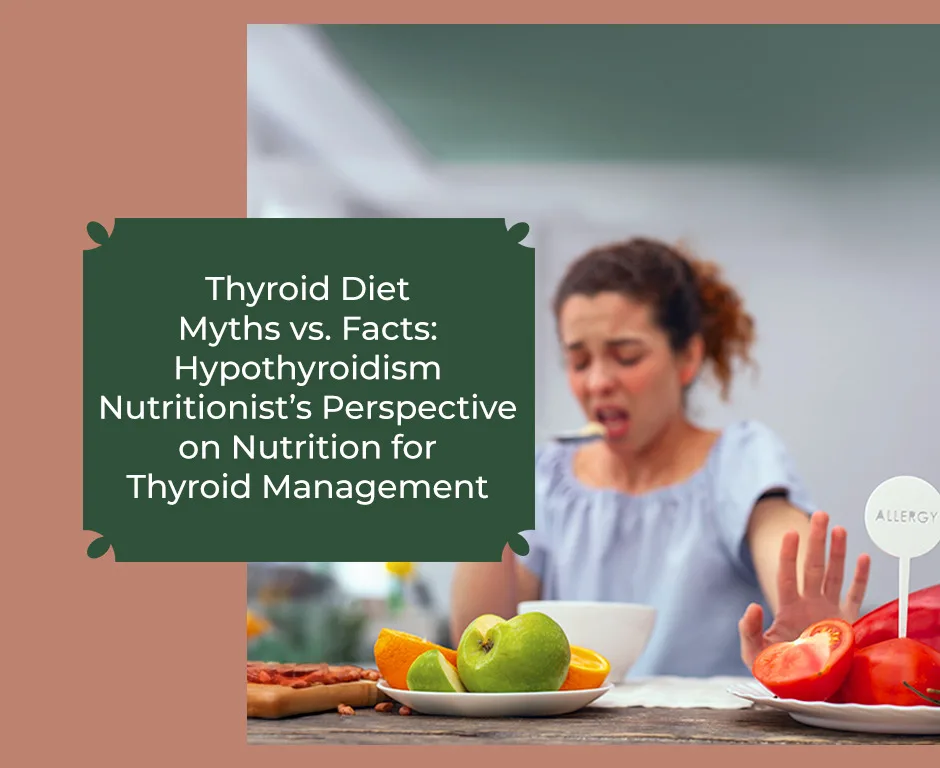Hypothyroidism is a term that has been gaining massive traction recently. Many people are understanding the depth of this dysfunction and are starting to get educated about it. If you are someone who has been diagnosed with hypothyroidism, you’ve probably experienced low energy, unaccounted weight gain, and moments of fatigue. A hypothyroidism diet plan can be your secret weapon against this dysfunction. However, there are many myths making rounds on the internet, and with so much conflicting information, it’s hard to choose the right diet. Although consulting a hypothyroidism nutritionist can be the best option, it is essential to debunk these myths and make you feel your best every day. Ready to learn some interesting facts? Let’s dive in.
Myth 1: People with hypothyroidism should avoid all dairy products
A common myth that we often hear is that people with hypothyroidism should avoid all dairy products. However, that isn’t true, dairy is rich in nutrients like Vitamin D and Calcium which are necessary for our health. Although calcium can affect how your body absorbs thyroid medication, eliminating it is not necessary.
Many people with hypothyroidism have lower levels of Vitamin D in their body and dairy can help counteract that. Additionally, dairy can also help support bone health. Consuming dairy should be a part of your hypothyroidism diet plan but the consumption should be spaced out. By simply timing it right, one can enjoy the benefits of dairy while also not letting it affect your body adversely.
Myth 2: Iodine Supplements Can Help Treat Hypothyroidism
There is a common belief entailing that consuming Iodine supplements can help with Hypothyroidism. However, a balanced diet usually contains the right amount of Iodine and extra consumption can make things worse. Iodine is necessary for thyroid health, but in this case, more is not better.
The best option here is to consult a specialized hypothyroidism nutritionist and trust your diet. If the diet consists of iodine-rich foods like fish, dairy, or eggs, you’re most likely completing your Iodine consumption. Although it is not unusual to take Iodine supplements, it is necessary to consult your doctor before making any decisions.
Myth 3: You Must Avoid Gluten if You Have Hypothyroidism
It is often believed that people with hypothyroidism should avoid gluten altogether. This is widely believed because hypothyroidism is closely connected with autoimmune thyroid disorders, but not everyone needs to avoid gluten altogether.
Consulting a hypothyroidism nutritionist is essential because if you have Hashimoto’s thyroiditis then gutting off gluten can be your best option. Many studies have shown that in certain people gluten can trigger an immune response that worsens thyroid inflammation. The best option here is to listen to your body and assess your condition accordingly. If you feel bloated or fatigued after consuming gluten, then cutting it off should be the best decision. If you don’t have Hashimoto’s or celiac disease, then consuming gluten won’t necessarily harm your health.
Conclusion
When it comes to managing hypothyroidism, learning about the myths and facts is extremely important. With multiple sources of information, it is recommended that you consult a hypothyroidism nutritionist who can guide you through a specialized hypothyroidism diet plan. The right guidance can completely change your health despite the shortcomings. If you’re looking for a special consulting session, then book an appointment with the Health Studio and get the much-needed expert advice.






